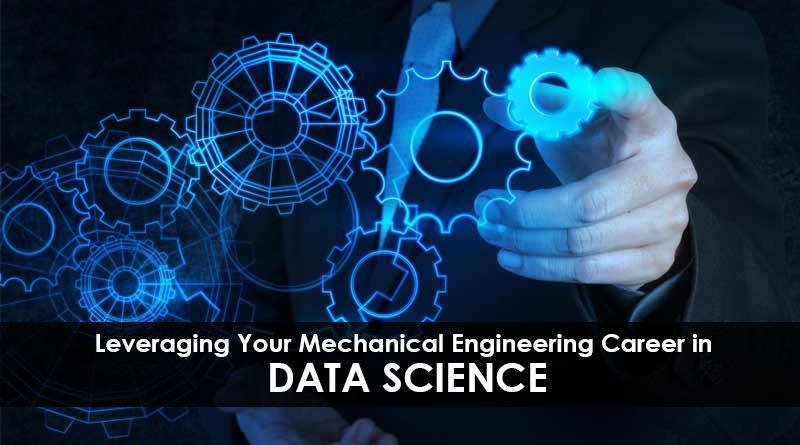

Mechanical Engineers today are excelling in every other domain
Analytics is not an exception. However let me tell you it’s a lot easier than mechanical engineering. If you can learn fluid mechanics, bending moment, law of gearing etc.
Then learning to play with data is child’s play. In fact here things are simpler, needs only two qualities, analytical intelligence and logics.
If a device can collect lots of data, apply machine learning and can find patterns and address problems that might otherwise show up only after long phases of testing.
Thermal, motion, positioning, pressure, optics, chemical and sound states are sensed and altered by sensors, transducers and actuators full of critical features requiring mechanical engineering to analyze, design, implement and test.
Mechanical engineering is one of the most interesting discipline that makes interaction between AI algorithms and the real world possible.
Henceforth it’s obvious there will be a huge demand for people who have both mechanical engineering and machine learning expertise. Once you find practical applications for the same, and you will never be out of a job for sure.
Every industry is driven by data in today’s evolving technological world. Data Science, an interdisciplinary field that utilizes logical and analytical techniques, procedures, calculations, and frameworks, to extract information and insights from numerous types of data, has become a basic necessity for all businesses. In this article, let us, deep-dive, into how data science for Mechanical engineers has been effective in driving good results.
Today, Data Science offers one of the most lucrative career opportunities in any industry. As the demand for Data Scientists is increasing, many professionals from different sectors are growing curious to know more about career shift opportunities.
Data science in Mechanical Engineering

Mechanical engineering is one of the most interesting discipline that makes interaction between AI algorithms and the real world possible. ... Henceforth it's obvious there will be a huge demand for people who have both mechanical engineering and machine learning expertise.
Can a Mechanical Engineer become Data Scientist?

While each student’s experience is different, we can safely say that keeping the academic background in engineering as a base, learners, as well as professionals who make a shift to the Data Science field, receive ample opportunities for career growth.
Why are mechanical engineers important to data science?

Machine learning relies on computer science, statistics and applied mathematics.
Because of their diverse background, mechanical engineers work effectively across these areas. The future of machine learning — and data science — will involve a deeper connection with physics; the more we want to apply machine learning to real-world problems, the more we need people who know how to work with nonlinear and dynamical systems, who can work in chaotic environments with ever-changing factors.
For example, how do we account for turbulence in airplane design? How do we better manage the impact of injury in a human body? How do we collect and convert energy from dynamic sources like the sun, wind and waves? Mechanical engineers have long been working in such areas; because of our experience with systems, sensors, controls and fluids, we have much to offer.
What are the Career Opportunities in Data science for mechanical Engineers?

The demand for Data Science professionals is at a record-breaking height at present. LinkedIn’s 2021 Emerging Jobs Report says that the Data Science domain is expected to see an increase in employment opportunities, along with Artificial Intelligence.
If you are thinking of switching from Mechanical Engineering to Data Science, now is the right time.
Once you become a complete Data Science professional, you may join any sector. IT, FinTech, e-Commerce, Healthcare, Agriculture, Retail, Travel & Hospitality, Banking & Insurance; Data Science professionals are required across all industries and domains. They also receive a very handsome remuneration.
According to PayScale, a Data science professional with 1-4 years of experience annually earns INR 5-7 lakh, and with 5-9 years of experience, one can earn an average of INR 13-14 lakhs per year.
While Switching from Mechanical engineering to Data science what is the best mode of learning?
If you are looking for opportunities in Data Science, there are several modes of learning available for both fresh graduates and professionals
You can take the help of online learning, work on open-source projects, read blogs, or follow fellow Data Science enthusiasts who showcase projects and work on real-world problems. You can also choose to enroll in an in-person classroom session, or an online curriculum, that involves live instructor-led learning.
While an in-person classroom session has its own benefits of real-time engagement and a wholesome learning environment, online training with live instructor-led sessions is also effective if you are not able to be physically present in a classroom. Just make sure whichever mode of learning you choose, the course you’ve selected for BIT must be industry-relevant, must help you understand Data Science tools and concepts thoroughly, and help you become a Mechanical Engineer turned Data Scientist.
What are the most useful tools one should learn as a Beginner in Data science?

The most popular tools being used in the industry are MS Excel, Python or R, Hadoop, Spark, and Tableau.
When it comes to programming for Data Science, Python is one of the most sought-after languages. Along with Python, R is also another popular programming language you must learn. R is a better tool for businesses because it is capable of making great business-ready reports using Rmarkdown (offers a framework for data science).
Once you gain more experience, you can use Shiny (a platform that allows users to interact with data sets and analysis) for interactive data products. When it comes to new tools, don’t be afraid to learn their usage and application for processing data.
How hard is it to transition careers from engineering to data science and machine learning?

Transitioning into Data Science after working for a couple of years as an Engineer can sound daunting, since Data Science is bent on a statistical mindset and reasoning. To break the barrier and switch successfully to data science and machine learning, one has to get a clear understanding about the advanced statistical tools and techniques needed to extract insightful information, trends and patterns from data. Having basic computer skills and technical skills makes it is a lot easier for an Engineer to change careers when compared to professionals coming from a non-technical background.
Applications of AI and ML in Manufacturing


Manufacturers are always keen to adopt technology that improves product quality, reduces time-to-market, and is scalable across their units. Artificial Intelligence, Machine Learning, and Robotic Process Automation are helping manufacturers fine-tune product quality and optimize operation.
These are the 3 most common applications of AI and ML.

Predicting mechanical failure
By continuously monitoring data (power plant, manufacturing unit operations) and providing them to smart decision support systems, manufacturers can predict the probability of failure. Predictive maintenance is an emerging field in industrial applications that helps in determining the condition of in-service equipment to estimate the optimum time of maintenance.
ML-based predictive maintenance saves cost and time on routine or preventive maintenance.
Apart from industrial applications, predicting mechanical failure is also beneficial for industries like the airline industry. Airlines need to be extremely efficient in operations and delays of even a few minutes can result in heavy penalties.
Situations like delay in taxing will result in severe fines for airlines, the primary reason for taxing delays results from airplanes experiencing mechanical failures or environmental situations that result in cascading delays.
This is directly related to sequential data. For making sense of sequential data, we can use machine learning models to predict such events.
AI for automatically segmenting brain tumors
Artificial Intelligence has a broad scope in healthcare devices and applications. It can make analysis, treatment, and monitoring of tumors more effective. For example, NVIDIA has developed a 3D MRI brain tumor segmentation using deep-learning and 3D magnetic resonance imaging technologies.
ML in mechanical engineering like Adaptive control involves reinforcement learning.
Separation between patterns equals clustering
Regression analysis plays an important role in mechanical engineering.
And when it comes to computational fluid dynamics, neural networks are the hottest new thing there
Join our Datascience training Program and Get Started With latest Technology.Register Now
Copyright Bitonlinelearn © 2021. All Rights Reserved | Design and Developed By BITINFOTECH